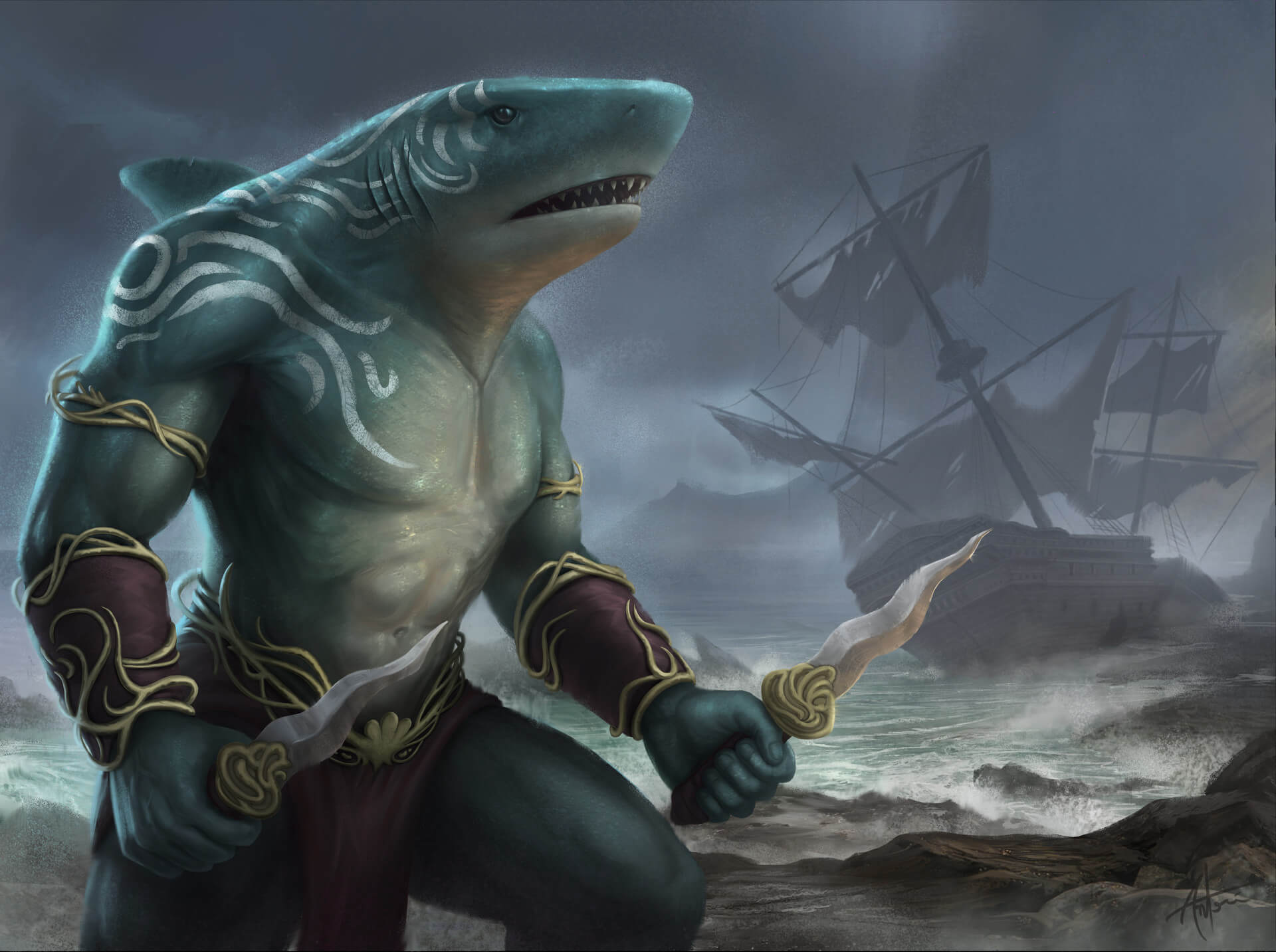Sharks, often misunderstood in popular culture as ruthless predators, have a much richer and nuanced history in mythologies and spiritual traditions. Across the globe, communities have revered sharks as gods, ancestors, protectors, and powerful symbols of nature’s forces. These “shark gods” hold immense cultural importance, intertwining humanity’s spiritual beliefs with the mysteries of the ocean.
This article dives into the fascinating mythology of shark gods, examining their cultural significance across regions like Hawaii, Papua New Guinea, the Marshall Islands, the Solomon Islands, and Japan. We’ll also explore how ancient reverence contrasts with modern narratives that portray sharks as villains.
Shark Gods of Hawaiian Mythology
Hawaiian culture has one of the most complex and revered relationships with sharks, worshiping them as gods or aumakua (ancestral guardians). Among these deities are Ka’ahupahau and her brother Kahi’uka, two of the most famous shark gods.
According to Hawaiian lore, Ka’ahupahau was once human but transformed into a shark goddess after her death. Residing near Pearl Harbor, she was known for protecting humans from man-eating sharks and patrolling the waters around Oʻahu. Her story is a fusion of compassion and regret, as she once ordered the punishment of a young girl, only to realize the severity of her actions too late. To ensure harmony, she decreed that no shark should harm humans in Pearl Harbor.
Hawaiians held immense respect for sharks, often associating them with deceased ancestors who would return in shark form to offer guidance or protection. This belief reflected a deep spiritual connection to the ocean and the creatures within it.
Ancestral Embodiments in Papua New Guinea
Sharks in Papua New Guinean mythology are deeply tied to ancestral reverence. Many coastal communities believe that sharks are the incarnations of their ancestors, serving as guardians of their families. These beliefs establish a spiritual link that reinforces the importance of treating sharks with respect.
For the people of Papua New Guinea, harming or disrespecting sharks is tantamount to severing ties with their lineage. The spiritual bond between people and their shark ancestors emphasizes a unique form of coexistence and reverence.
Sacred Sharks in the Marshall Islands
In the Marshall Islands, sharks were considered sacred and integral to tribal identity. Each tribe had its own “sacred shark,” believed to act as a protector and mediator for the group. Disrespecting another tribe’s shark was a grave offense, often escalating to conflict if not rectified with an apology.
This cultural reverence ensured an ecological balance, where sharks were seen not as threats but as powerful allies and sacred beings worthy of protection.
Dark Myths of the Solomon Islands
While sharks were often associated with protection and reverence, darker myths also emerged in certain cultures. For instance, the Solomon Islanders believed sharks could be appeased through human sacrifice. People cast victims, both living and deceased, into shark-infested waters to curry favor from these beings.
However, even in these grim narratives, sharks were spiritually significant, embodying forces that demanded respect rather than arbitrary fear or hatred.
Shark Mythology in Tlingit Culture
Among the Tlingit people of British Columbia, a haunting myth speaks of a woman who became a shark after being abducted by one of these creatures. This transformation tale highlights the intertwined nature of humanity and the natural world in Tlingit storytelling.
Such myths suggest that humans and sharks share a symbolic and spiritual connection, even in regions where sharks aren’t the primary focus of daily life.
The Bangudya of Aboriginal Australia
Australian Aboriginal mythology offers another lens through which shark gods are viewed. The Bangudya, a giant tiger shark, appears in the Songlines mythology, which spans millennia. According to legend, the reddish rocks on Chasm Island mark the violent encounter between Bangudya and a half-dolphin, half-man being.
For Aboriginal Australians, such myths help explain natural phenomena, connecting the land’s features to the spiritual world. These narratives underscore the enduring power and danger associated with sharks.
The Shark-Man God of Japanese Folklore
Japanese folklore introduces a different interpretation of shark gods. The “shark-man” god (or samebito) is fearsome yet mystical. Known for his ability to control the wind and rain, he was believed to summon destructive typhoons at will.
This depiction combines reverence and trepidation, framing sharks as forces capable of influencing the ocean’s behavior and, by extension, humanity’s fate.
Ancient Reverence vs. Modern Perceptions
For centuries, many cultures regarded sharks as spiritual and ecological partners. However, the modern narrative has shifted. Western media often portrays sharks as villains, perpetuating fear through films like Jaws and regular emphasis on shark attacks (despite their rarity).
This demonization not only erodes the reverence seen in traditional shark mythology but endangers shark populations. Today, humans kill an estimated 100 million sharks annually, disrupting marine ecosystems.
Conversely, ancient traditions highlight coexistence and balance with sharks. These myths remind us that respect for sharks is essential—not only in mythology but also in real-world conservation efforts.
Closing Thoughts
Shark gods are more than mythological figures; they represent humanity’s complex relationship with the ocean. From the protective Ka’ahupahau of Hawaii to the sacred sharks in the Marshall Islands, these stories reveal cultures that viewed sharks with awe, reverence, and understanding.
Revisiting these myths inspires a shift in how modern societies perceive sharks—not as ruthless predators but as vital, misunderstood creatures in need of protection.
If you’re fascinated by these ancient connections between humans and the natural world, explore more myths about ocean deities and venture into the realm of shark mythology. By understanding and honoring these traditions, we can advocate for the conservation of one of the ocean’s most misunderstood inhabitants.








